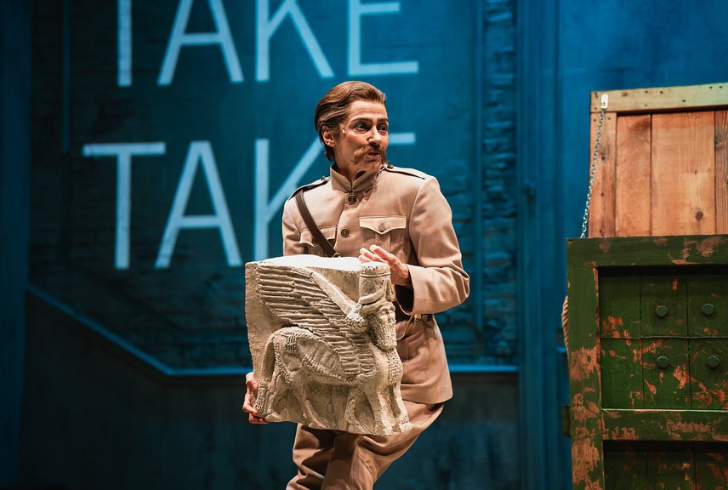The Assyrian language isn’t something most Chicago theatergoers expect to hear, let alone feel settle in their chest like a hymn sung in a grandmother’s kitchen. But “Iraq, But Funny” doesn’t ease into its subject—it barrels in with satire, history, and a biting sense of cultural clarity. Staged at Lookingglass Theatre through July 20, the play rewrites the way Middle Eastern stories are framed, this time by the people who’ve lived them.
Co-created by Atra Asdou and Dalia Ashurina—both Assyrian, both Chicagoans—the show doesn’t play the respectability game. It uses its voice, its music, and its sense of absurdity to trace a family line that stretches across five generations, war zones, and dinner tables.

Instagram | @your_gal_dal | Atra Asdou brings Assyrian history to life with powerful voices and deep cultural pride.
The Humor Hits First, Then the Weight Arrives
At the center of it all is The English Gentleman (TEG), a pompous narrator with a colonial chip on his shoulder and a comically warped worldview. He’s the kind of character who explains genocide like he’s giving a TED Talk at a golf club. It’s all part of the setup—he delivers misinformed, Eurocentric overviews, only to have them deconstructed by the very family stories the play is built on.
And those stories don’t shy away from complexity. Forced marriages, genocide, church politics, immigration—they’re all there, delivered through characters who know how to grieve and laugh without turning either into a performance for outsiders.
Assyrian History
You won’t find a museum diorama version of Assyrian culture here. Instead, the language lives in casual insults between siblings, in lullabies sung through grief, and in the offhand jokes only someone raised in a diasporic household would dare make.
What’s remarkable is how seamlessly these elements live beside one another. One scene throws you into political farce; the next rests in silence as a character sings a jinaneh—a traditional mourning poem—written for the play and performed with stripped-back intimacy. The songs don’t interrupt the narrative; they deepen it.
The Cast Doesn't Perform Identity, They Wear It
There’s no tokenism, no flattening of character into a cultural bullet point. The actors—Gloria Imseih Petrelli, Susaan Jamshidi, James Rana, and Sina Pooresmaeil—don’t lean into “representation.” They just exist on stage, fully realized, as if these roles were cut from their own family photo albums.
Pronunciation of Assyrian is sharp and intentional, which matters. For a community whose language has been under pressure for centuries, every syllable delivered correctly is an act of reclamation. And the cast delivers it like second nature.
The Design Isn’t Just Clever, It’s Intentional
Instead of building a static set, the design team created something responsive. Platforms shift, props morph, and sound moves between past and present without drawing attention to itself. Scenes bleed into each other, not to confuse but to mimic memory—the kind you inherit rather than experience firsthand.
Lighting and sound aren’t there to impress; they’re there to haunt. During the jinaneh sequences, you feel the room tighten. There’s no spotlight to tell you what to feel. It lets the audience sit with the discomfort.

Instagram | @lookingglasstheatre | The cast brings each moment to life with care, language, and powerful emotion.
A Larger Movement, Not a One-Off
“Iraq, But Funny” is part of a growing, defiant body of Assyrian work emerging in American theater. Other voices—like those behind Dummy in Diaspora or Layalina—are redefining what it means to write about identity without having to explain it. These plays speak to Assyrians first and invite everyone else to listen in.
This isn’t nostalgia or cultural tourism. It’s architecture. It’s building space where there wasn’t any.
The Joke Isn’t the Point
Laughter gets people in the door. But what stays is the honesty—the unapologetic tone, the resistance to softening the narrative, the refusal to translate trauma into tidy takeaways. You don’t leave quoting catchphrases. You leave remembering a voice, or a look, or a line that felt uncomfortably close to something you’ve seen in your own family.
That’s the real success of “Iraq, But Funny.” It doesn’t beg to be understood. It speaks clearly and waits for you to catch up.
